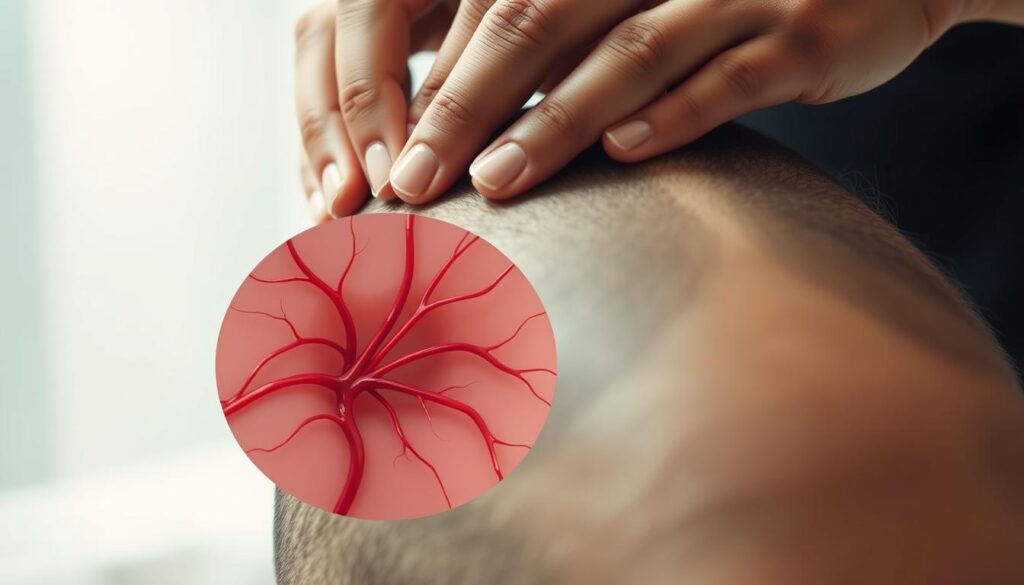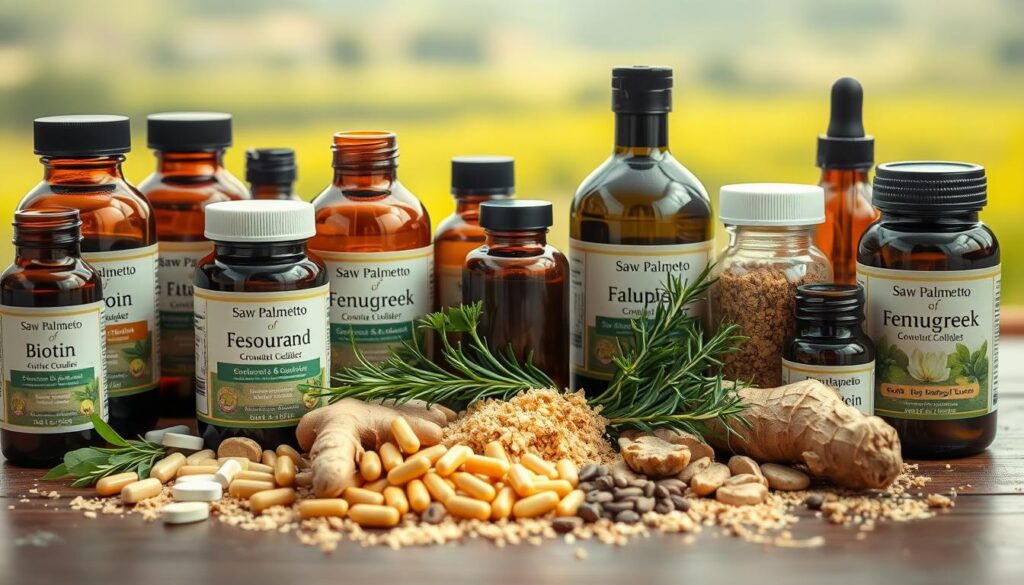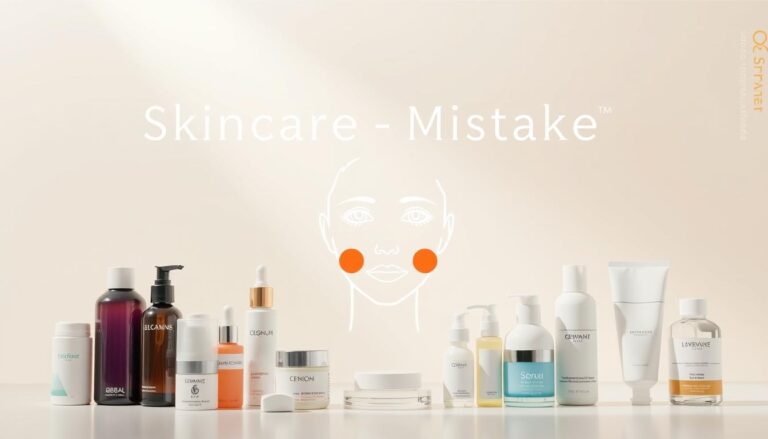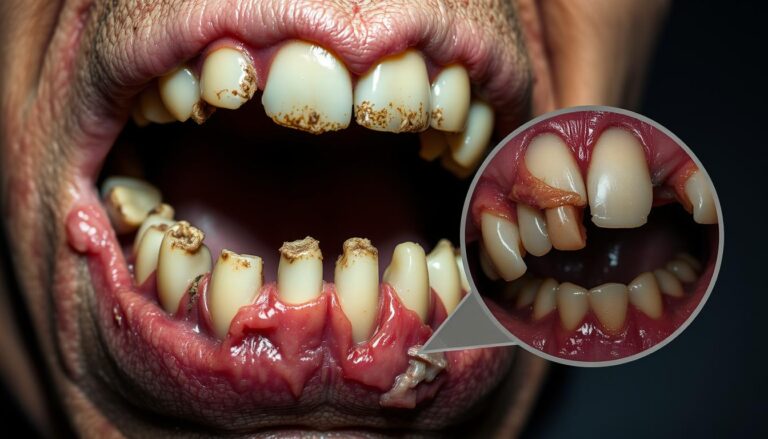Natural Ways to Grow Hair: How to Boost Thickness Naturally
Ever looked in the mirror and felt upset about thinning hair? Or seen more hair falling out than before? You’re not alone. Hair loss is tough, affecting millions in the U.S., with over 85% of men and 55% of women experiencing it.
Looking for natural ways to grow hair can change everything for those dealing with loss. The bright side is, many natural remedies can help make your hair thicker and healthier. You don’t need harsh chemicals to do it.
Learning about hair loss and finding natural fixes can help you control your hair’s health. You can try essential oils or change your diet to help your hair grow strong. There are many ways to stop hair loss and grow more hair.
Key Takeaways
- Hair loss is common, affecting 30 million women and 50 million men in the United States
- Natural hair growth remedies can be effective alternatives to medical treatments
- Diet, lifestyle, and scalp care play crucial roles in hair health
- Essential oils like rosemary and pumpkin seed oil show promising results for hair growth
- Stress management and proper nutrition can significantly impact hair thickness
Understanding Hair Growth Cycle and Common Causes of Hair Loss
Your hair goes through a fascinating journey of growth and renewal. This process is crucial for maintaining healthy hair. The human scalp has about 100,000 hair follicles, each with its own growth cycle.
The hair growth cycle has three main phases. These phases affect your hair’s health and look:
- Anagen (Growth Phase): The most active stage lasting 3-7 years
- Catagen (Transition Phase): A brief 2-3 week period of transformation
- Telogen (Resting Phase): A 3-4 month period before hair falls out
What Influences Hair Loss?
Many factors can disrupt your hair care routine and cause hair loss. Genetics are a big factor, with 95% of male hair loss linked to genes. Other key factors include:
- Hormonal changes
- Nutritional deficiencies
- Chronic stress
- Medical conditions
- Medications
It’s normal to lose 50-100 hairs a day. Your hair reaches its peak density by age 30. After that, it may start to thin. Taking care of your hair and preventing loss can help keep it healthy and looking good.
Essential Oils and Natural Remedies for Hair Growth
Discovering natural solutions for hair growth can change your hair care routine. Essential oils for hair are getting a lot of attention. They are seen as powerful herbal hair treatments that help hair grow.
Natural remedies can help a lot with hair growth. Research has found several essential oils that are good for hair restoration and maintenance.
Benefits of Rosemary Oil
Rosemary essential oil is a great natural hair growth solution. Studies show it has amazing potential:
- It works as well as 2% minoxidil in growing hair
- It causes less scalp irritation than other treatments
- It boosts blood flow to the scalp
Pumpkin Seed Oil Applications
Pumpkin seed oil is great for hair health. Research shows it can really help:
- It increases hair count by 40% in men after 6 months
- It supports natural hair growth
- It’s full of nutrients that feed hair follicles
To maintain the safety and beauty of your mouth, you can use this nutritional supplement
Black Seed Oil Solutions
Black seed oil helps a lot with hair growth and scalp health. It makes hair stronger and reduces hair loss.
Always dilute essential oils properly and consult with a healthcare professional before starting any new hair treatment regimen.
When trying herbal hair treatments, remember results can vary. Be patient and use them regularly for the best results.
Natural Ways to Grow Hair Through Diet and Nutrition
Your diet is key to healthy hair growth. Eating foods rich in protein can make your hair stronger and look better. Not getting enough nutrients can cause hair to thin and fall out.
Eating a balanced diet with all the right nutrients is important. Biotin is known for helping hair grow, but it’s not the only thing you need.
Essential Nutrients for Hair Health
- Protein: Critical for hair structure and growth
- Iron: Prevents hair loss and supports follicle health
- Zinc: Supports hair tissue repair and growth
- Vitamin E: Protects hair follicles from oxidative stress
| Nutrient | Food Sources | Daily Benefit |
|---|---|---|
| Protein | Eggs, Lean Meats, Lentils | Supports hair structure |
| Biotin | Nuts, Eggs, Greek Yogurt | Promotes hair growth |
| Iron | Sardines, Spinach, Oysters | Prevents hair loss |
Pro tip: Aim for a diverse diet that includes a variety of nutrient-dense foods to support optimal hair health.
“Your hair reflects your overall nutritional status” – Nutritional Science Research
Eating foods high in omega-3s, like salmon and chia seeds, can help your hair grow. A Mediterranean diet is also good for hair, especially for those with thinning hair.
While supplements can be helpful, they can’t replace a good diet. Talking to a healthcare professional can help you make a diet plan that’s right for your hair.
The Power of Scalp Massage and Circulation
Unlocking the secret to healthier hair might be as simple as mastering scalp massage techniques. Your scalp is more than just the foundation for your hair – it’s a critical ecosystem. It can dramatically impact hair loss prevention and overall hair health.

Scalp massage is a powerful, natural approach to stimulating hair growth. Research shows that consistent massage can transform your hair’s health in surprising ways.
Proper Massage Techniques
Effective scalp massage requires more than random touching. Here are key techniques to maximize hair growth potential:
- Use gentle, circular motions with fingertips
- Apply light to medium pressure
- Cover entire scalp systematically
- Use essential oils for enhanced stimulation
Benefits for Hair Follicle Stimulation
Scalp massage offers remarkable benefits for hair loss prevention. By increasing blood circulation, you can:
- Awaken dormant hair follicles
- Reduce stress-related hair loss
- Improve nutrient delivery to hair roots
- Strengthen existing hair strands
Frequency and Duration Recommendations
For optimal results, experts recommend:
- Duration: 10-15 minutes per session
- Frequency: Twice daily (morning and evening)
- Consistency: Daily practice for at least 10 weeks
Nearly 70% of participants experienced thicker hair follicles with daily scalp massages.
By integrating these scalp massage techniques into your routine, you can take a proactive approach to hair loss prevention. This promotes healthier, stronger hair growth.
Lifestyle Changes for Healthier Hair Growth
Your daily habits are key to natural hair care. Stress management is crucial for strong, vibrant hair. Every choice affects your hair’s health and growth.
Some lifestyle changes can improve your hair quality and growth. Here are important ones:
- Quit smoking to prevent accelerated hair loss
- Reduce alcohol consumption
- Protect hair from environmental pollutants
- Manage stress through mindful practices
Stress can cause hair loss by disrupting growth. Chronic stress can push hair follicles into a resting phase, leading to unexpected hair shedding. It also affects hair and cytokine balance, harming hair health.
Sleep and relaxation are vital for hair care. Meditation, yoga, and regular sleep help hormones that support hair growth. Taking care of your mind helps your hair too.
Your hair reflects your overall health—treat your body holistically to see remarkable improvements.
Environmental factors like sun and pollution harm hair follicles. Wearing protective headgear and using natural hair care products with UV protection help. Also, eating a nutrient-rich diet is important.
Natural Hair Care Practices and Protection
Keeping your hair healthy is key. It’s not just about washing it. It’s about knowing what your hair needs and giving it gentle care.

Gentle Hair Care Methods
Your hair needs gentle care to stay strong. Here are some important tips:
- Detangle hair gently from ends to roots to minimize breakage
- Use soft microfiber towels instead of rough cotton materials
- Avoid tight hairstyles that can cause traction alopecia
- Choose silk or satin pillowcases to reduce friction
Protection from Environmental Damage
Things outside can harm your hair. Herbal treatments help protect against UV rays, pollution, and humidity. Wear hats, use natural leave-in conditioners, and avoid too much sun.
Natural Hair Washing Techniques
Regular washing can take away hair’s natural oils. Use sulfate-free shampoos and follow these tips:
- Wash hair 2-3 times weekly to keep oil balance
- Use lukewarm water to prevent moisture loss
- Apply deep conditioning treatments weekly
- Rinse with cool water to seal hair cuticles
Remember: Healthy hair starts with a healthy scalp and mindful care.
Stress Management for Hair Health
Stress can harm your hair, causing a condition called telogen effluvium. When stressed, up to 15% of your hair follicles can stop growing. This leads to hair loss. It’s important to manage stress to keep your hair healthy.
Chronic stress makes your body produce more cortisol. This hormone can shrink hair follicles and mess with hair growth. It can make your hair thinner and fall out faster.
Effective Stress Reduction Techniques
- Practice daily meditation for 15-20 minutes
- Engage in regular physical exercise
- Maintain a consistent sleep schedule
- Implement deep breathing exercises
- Limit caffeine consumption
Eating right is key to preventing hair loss. A diet full of proteins, vitamins, and minerals helps fight stress-related hair problems. Include foods that are good for your hair:
| Nutrient | Food Sources | Hair Health Benefits |
|---|---|---|
| Protein | Eggs, beans, lean meats | Supports hair structure |
| Vitamin D | Fatty fish, sunlight exposure | Activates hair growth cycles |
| Iron | Spinach, red meat | Prevents hair loss |
“Your hair’s health is a reflection of your overall well-being” – Holistic Hair Care Expert
Exercise helps control stress hormones and improves hair health. Try to exercise for at least 30 minutes a day. Managing stress is not just about preventing hair loss, but improving your overall quality of life.
If you’re losing a lot of hair or feeling really stressed, talk to a healthcare professional. They can help you with stress management and hair health.
Herbal Supplements and Natural Boosters
Looking for natural ways to grow hair can change your life if you’re losing hair. Herbal treatments are a good alternative to traditional methods. They offer hope for those wanting natural solutions.

Biotin for hair growth is getting more attention. It’s not a magic fix, but it’s important for healthy hair. Studies show biotin can make hair stronger and might help with hair loss if you’re not getting enough.
Essential Nutrients for Hair Health
There are important nutrients for growing hair:
- Zinc: Helps grow and fix hair tissue
- Iron: Keeps hair from falling out
- Selenium: Protects hair follicles
Traditional Herbal Remedies
Herbal solutions have shown good results for hair growth:
- Saw Palmetto: Cut hair loss by up to 29%
- Ginseng: Might make hair follicles grow more
- Rosemary Oil: Works as well as minoxidil in growing hair
Supplement Effectiveness
Research shows some supplements work well. For example, Viviscal supplements increased hair strands after 90 and 180 days. People noticed their hair was thicker and covered more of their scalp.
Remember, while herbal treatments can be beneficial, individual results may vary. Consulting with a healthcare professional is always recommended before starting any new supplement regimen.
When to Seek Professional Help for Hair Loss
Knowing when to get help for hair loss is key for keeping your hair healthy. Some hair fall is normal, but some signs mean you should see a doctor.
Look out for these important signs that mean you should visit a dermatologist or trichologist:
- Sudden or patchy hair loss
- Scalp irritation or unusual scalp conditions
- Dramatic changes in hair texture
- Hair loss accompanied by pain or itching
- Noticeable thinning in specific areas
Medical issues can really affect your hair. About 30% of people with thyroid problems lose hair. Autoimmune diseases, hormonal changes, and some medicines can also cause hair to fall out.
Experts can help with hair loss in many ways:
- Topical medications like minoxidil
- Prescription treatments
- Scalp treatments
- Hair transplant procedures
- Personalized nutritional guidance
Early action can stop permanent hair loss and help your hair care journey. With about 50 million men and 30 million women in the U.S. losing hair, getting expert advice is a smart move for healthy hair.
Conclusion
Looking into natural ways to grow hair opens up a path to healthier, more vibrant locks. Your hair growth journey is unique. It involves many strategies to support stronger, fuller hair.
The key is understanding that hair health needs a holistic approach. This includes diet, lifestyle, and targeted hair growth remedies.
Nutrition is key in hair development. Eating foods rich in biotin, vitamins, and minerals can boost hair strength and growth. Essential oils like rosemary and peppermint can also help, offering natural alternatives to traditional treatments.
Your commitment to consistent care can change your hair’s look and health.
Stress management, scalp care, and knowing your hair growth cycle are vital for hair restoration. While genetics and age affect hair growth, natural remedies can help. Patience is key; big changes often take several months of dedicated care.
Remember, your hair shows your overall health. By using a balanced approach with nutrition, stress reduction, and natural treatments, you can unlock your hair’s potential. Your journey to healthier, more resilient hair begins with understanding and nurturing your unique hair growth process.
FAQ
How long does it typically take to see results from natural hair growth methods?
Natural hair growth methods need 3-6 months of consistent use to show results. Hair growth is slow, so patience is important. Your genetics, health, and how well you follow the methods can affect how fast you see results.
Are essential oils effective for hair growth?
Yes, oils like rosemary, peppermint, and lavender can help hair grow. They improve scalp circulation and may stimulate hair follicles. Always mix essential oils with a carrier oil and test them first.
What nutritional deficiencies can cause hair loss?
Lack of iron, protein, biotin, vitamin D, and zinc can lead to hair loss. A diet rich in lean proteins, greens, nuts, and whole grains supports hair health.
How often should I massage my scalp to promote hair growth?
Massage your scalp 3-4 times a week for 5-10 minutes. Use circular motions with your fingers or a scalp tool. Regular massage boosts blood flow and may stimulate hair growth.
Can stress really cause hair loss?
Yes, stress can cause hair loss by pushing hair follicles into a resting phase. Managing stress through meditation, exercise, and sleep can help your hair health.
Are natural hair growth remedies as effective as medical treatments?
Natural remedies work for mild to moderate hair thinning. But, they might not be as effective as medical treatments for severe loss. If you have significant hair loss, see a dermatologist for more options.
What are the best foods for promoting hair growth?
Foods like salmon, eggs, spinach, sweet potatoes, nuts, and Greek yogurt are great for hair. Eating a variety of these can help your hair grow stronger and healthier.
How can I protect my hair from environmental damage?
Use sulfate-free shampoos, wear hats in sunlight, and avoid heat styling. Use conditioners with UV protection and avoid harsh chemicals. Stay hydrated and eat well to protect your hair from damage.
Are hair growth supplements worth taking?
Supplements like biotin can help hair health, but they work best with a balanced diet and lifestyle. Not all supplements are the same, and too much can be harmful. Always talk to a healthcare professional before starting supplements.
When should I be concerned about hair loss and seek professional help?
If you notice sudden hair loss, patchy baldness, scalp irritation, or significant thinning, seek help. These signs could mean an underlying health issue that needs medical attention.







